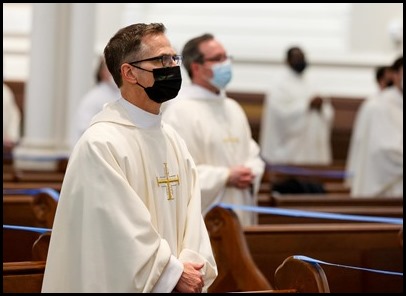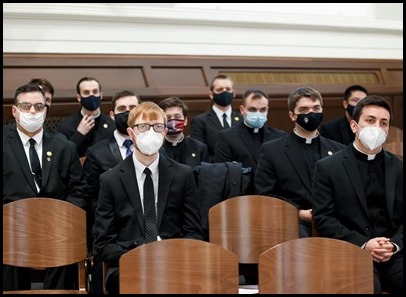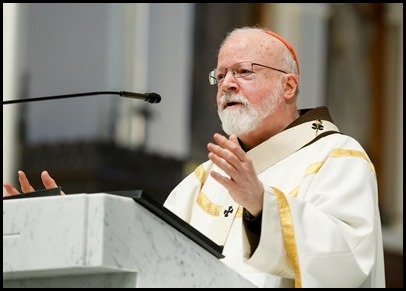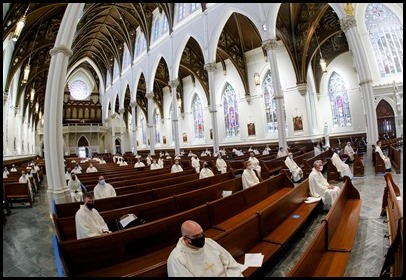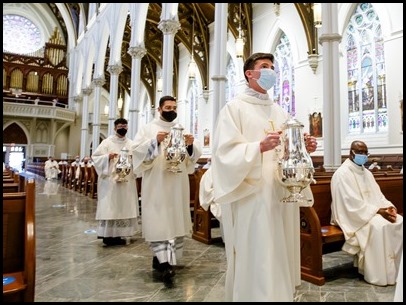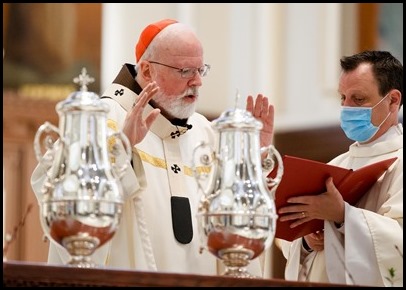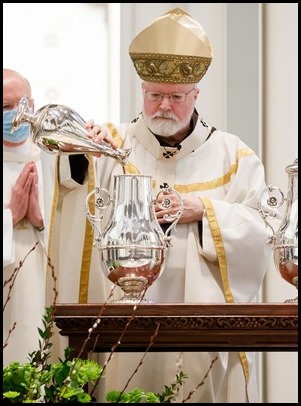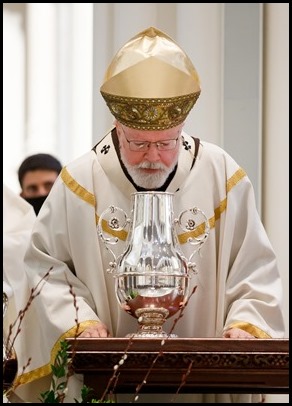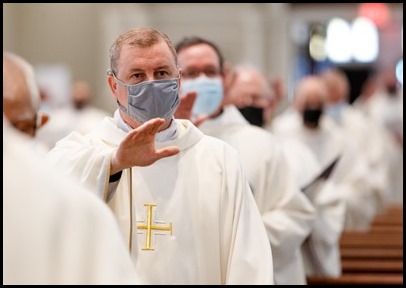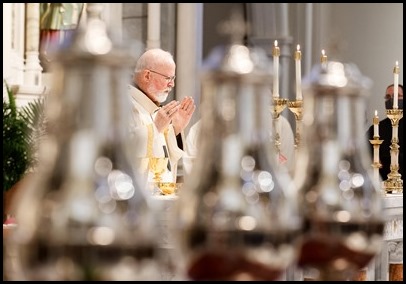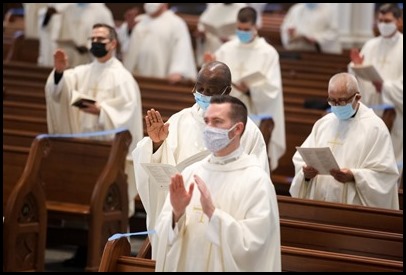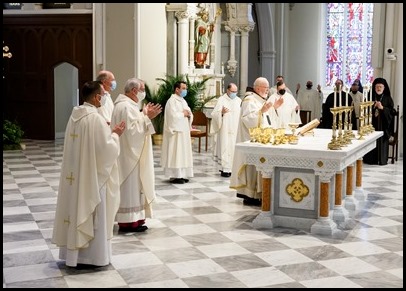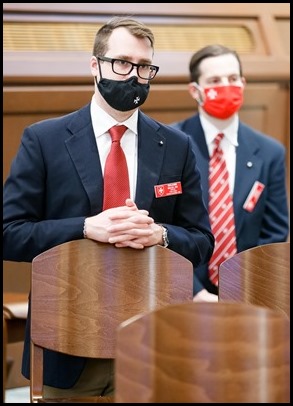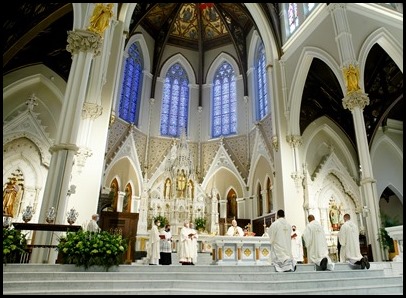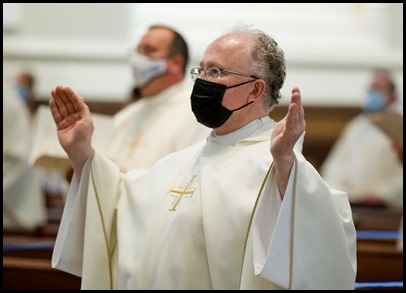Hello and welcome!
As I do each Holy Week, I am posting my blog a bit earlier than normal so as to leave myself free for the many activities and liturgies of the Easter Triduum.
Last Friday, The Papal Foundation organized a Zoom meeting with some of our supporters in order to help them to better understand the kinds of activities that are being supported by the foundation.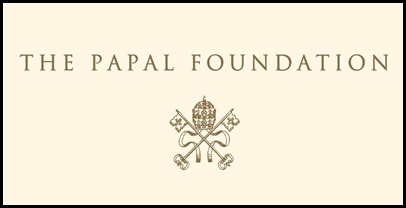
The main speaker of the gathering was Archbishop Joseph Marino, who is now the head of the Pontifical Ecclesiastical Academy, which trains the nuncios and diplomats of the Holy See. It was very consoling to hear him speak, realizing that he is the person who is training nuncios for the Holy Father because he really wants the nuncios to be good priests and good shepherds. It was very encouraging.
Archbishop Marino was, himself, a diplomat in many places in Southeast Asia, such as Bangladesh and East Timor. He was extremely animated and passionate in recounting his experiences as nuncio there during very difficult times, and he expressed his great gratitude for the Papal Foundation, which has been such an extraordinary help to the people in those countries.
Such testimonies help us to realize how much good is done through the generosity of the Papal Foundation and its many projects supporting the Church and helping the poor throughout the world.
Friday was also the funeral of Father Joseph Smyth at St. Joseph Church in the West End. He was an extremely learned and credentialed man with degrees from Harvard and had been the first personnel director of the archdiocese.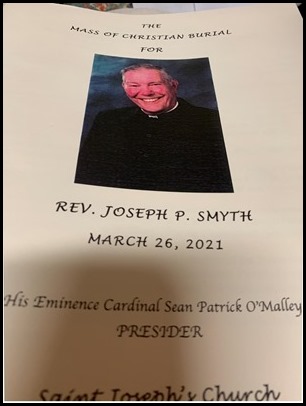
Father Michael Lawlor gave a very beautiful reflection on his life and ministry.
It was the first time that we have been able to have a wake and funeral Mass with the residents of Regina Cleri present. So, it was wonderful that the priests were able to come over to St. Joseph Church for Father Smyth’s funeral.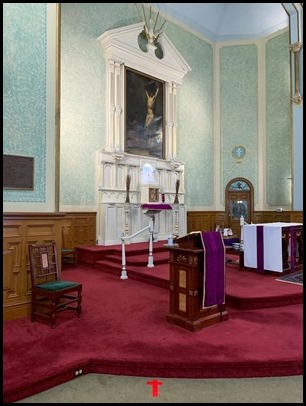
That evening, I was very honored to be invited to attend the ecumenical prayer service for the new Mayor of Boston, Kim Janey, along with a number of ministers and imams from local congregations. It was an opportunity to pray for our city’s new leader and for unity, and we pray that God will inspire her to be a force for good in our community.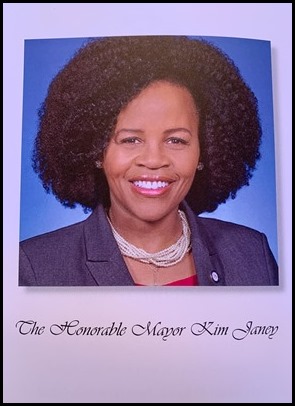
It was held in-person at the Congregation Lion of Judah in Boston, observing all the required precautions. So, it was also wonderful to be able to gather once again with other local clergy since we haven’t really had an opportunity to be together with other religious leaders during this time.
Saturday, I went to San Lorenzo Friary in Jamaica Plain to bless the van used by Capuchin Mobile Ministries in their outreach to the homeless.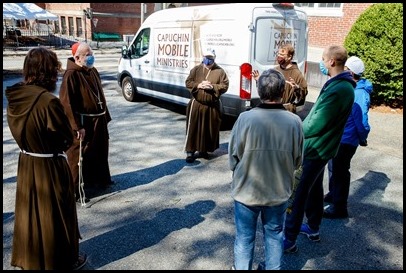
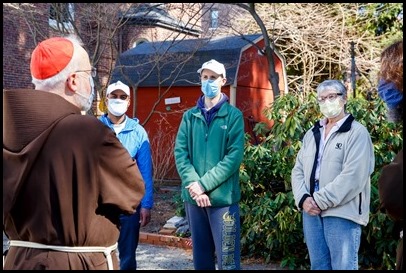
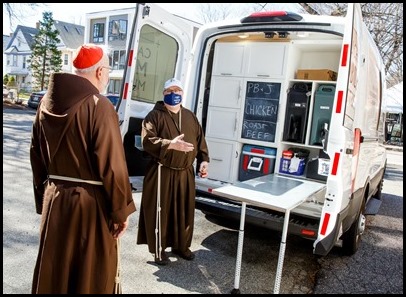
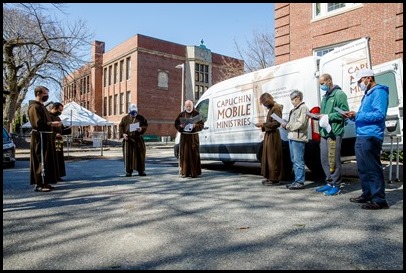
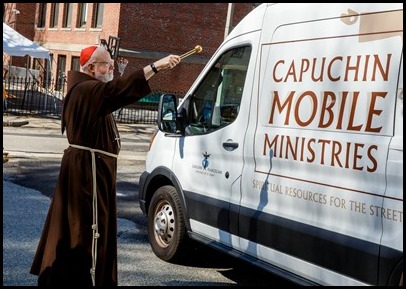
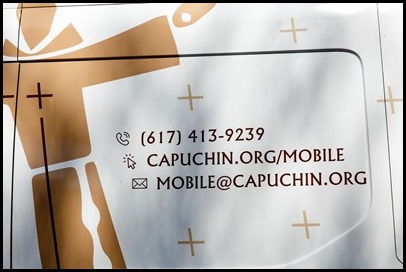
This initiative was begun last summer to serve the homeless population in Boston and Cambridge. They go out two days a week, along with a number of volunteers, to distribute food and other necessities. Not only that, but they also speak with the homeless, pray with them and ask for their intentions, which are brought back and prayed for in the community.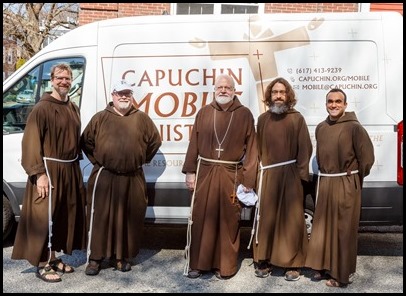
I am very consoled by this because Pope Francis, in Evangelii Gaudium, urges us to not only worry about providing for people’s material needs; the poor need the spiritual sustenance of the Church, as well. In this effort, they are fulfilling that call to minister to them and pray with them.
Sunday, I was very happy to be able to celebrate the Palm Sunday Mass at the cathedral. It was a wonderful celebration, and I was happy to see such a good turnout of people.
Also, that day, I participated virtually in the wake service for Father Roberto McCreary, who spent almost his entire ministry working in Puerto Rico and was there when I was sent to Puerto Rico as a young friar. His cousin, Father Robert McCreary, who is known to many people here in Boston, gave a reflection on his life.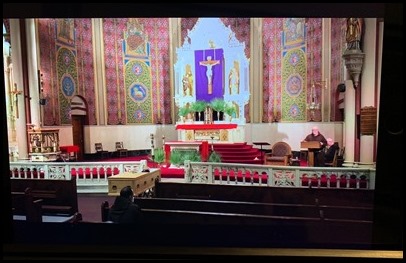
It was wonderful to be able to participate in his wake, which took place in the Church of St. Augustine in Pittsburgh, the church where I was professed and ordained. I have many beautiful memories of the important events that have taken place there.
Everyone was delighted to be able to gather on Tuesday of Holy Week for our annual Chrism Mass at the Cathedral of the Holy Cross. Last year, we were forced to delay the celebration of the Chrism Mass until the Feast of St. John Vianney in August because of the lockdown. 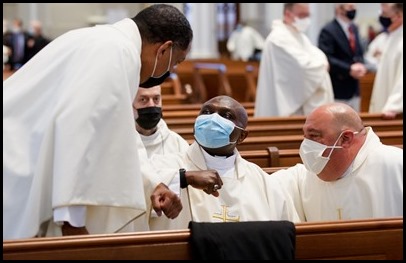
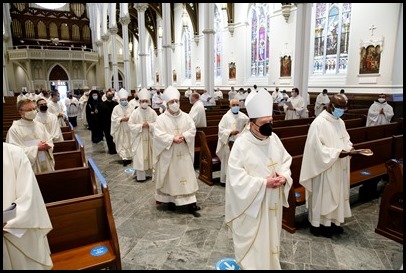
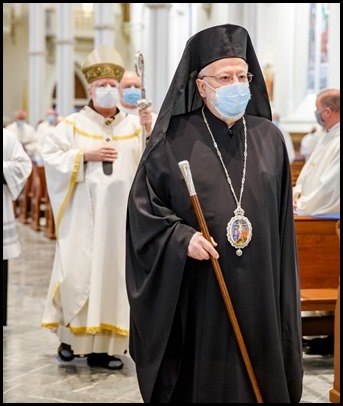
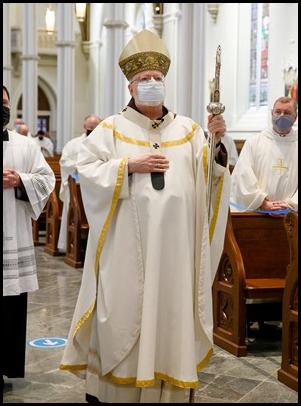
We were delighted to once again be joined by Metropolitan Methodios and Father Ted Barbas of the Greek Orthodox Metropolis of Boston and, as always, I invited Metropolitan Methodios to offer a word of greeting before the Mass.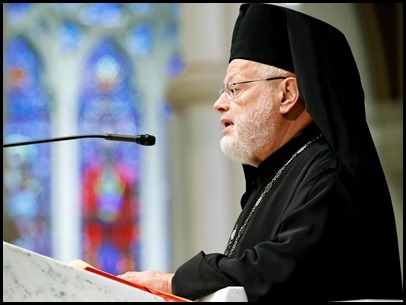
The Chrism Mass is a special moment in which we express the unity of the presbyterate in blessing the oils that are the tools of our ministry — used in the sacraments of baptism, confirmation and ordination and, especially important during the pandemic, the anointing of the sick. We had a very good turnout of the priests and auxiliary bishops of the archdiocese. We were also joined by a number of our seminarians and our transitional deacons, who will soon be ordained themselves.
As I have previously shared, we have had a new cross installed by the entrance of the cathedral, which had been donated by the Deeley family to the Little Sisters of the Poor in Somerville. When the sisters left Somerville, it was donated to the cathedral. Msgr. O’Leary has now had it illuminated at night.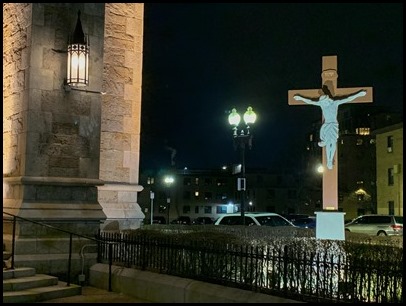
Being the Cathedral of the Holy Cross, it is beautiful to have such an impressive crucifix outside for all to see as they pass by.
The liturgical directives call for the recitation of the Liturgy of the Hours at the cathedral during Holy Week, and one of the ways that we do that is through the celebration of Tenebrae on Spy Wednesday. As always, Cathedral Music Director Richard Clark and the choir did a spectacular job with the music.
It’s a beautiful moment to gather together in anticipation of Holy Thursday and the Sacred Triduum.
And, as we begin our celebration of the Sacred Triduum, I’d like to leave you with my Easter message:
Easter is the center and core of Christian faith. Christian faith is Resurrection faith; the Risen Christ, having conquered sin and death, remains with us across the ages. When we celebrate “the Triduum” — the great feasts of Holy Thursday, Good Friday, the Easter Vigil and Easter Sunday — we recall and present again through words and worship the Passion, Death and Resurrection of the Lord.
The Lord’s Easter gift to the Church and the world is the gift of hope. Because the Risen Christ remains with us personally and collectively, we never face the challenges of life alone. Christian hope teaches us that we are destined for eternal life, and hope also is meant to sustain us in the concrete realities we face each day. As we celebrate this Easter, no truth is more relevant than hope built on Christian faith.
The past year, lived in the shadow of the COVID-19 pandemic, has tried our sense of hope personally, socially, and as a country. The process of recovery and rebuilding our society will test us again in new ways. In some form, we have all been impacted by this silent and elusive but deadly virus. No community has been spared, and some communities have been devastated. Recovery will require a spirit of collaboration, cooperation and compassion. Easter tells us we will not be alone in this effort; the Risen Christ calls us to be very good neighbors to each other.
Throughout the past year, there have been multiple examples of what being a good neighbor means. We have seen health care workers risk their lives to save lives; we have seen front-line workers in stores, delivery agencies and police and fire departments show up every day, even at personal risk, so basic needs could be met and life could be sustained. These examples inspire hope in human terms; we will need this kind of generosity on an even wider scale in the days and months ahead.
Nationally and locally, the pandemic illustrated again that, even when broad structural issues like a pandemic affect us all, they impact some in catastrophic fashion. African American and Hispanic communities suffered dramatically greater losses — of life and welfare — than the general population. Often, these communities have been where many front-line workers live; they kept faithfully serving others even as they suffered disproportionately themselves. National recovery should reward this service appropriately in gratitude and in public policies focused on these communities.
Any assessment of how we have responded to the pandemic will need to address two realities. There have been countless acts of charity and compassion offered quietly and effectively each day to those in need. And, by contrast, there have been intensified expressions of racism in our public life; historic patterns aimed at Asian Americans, African Americans, and immigrants. Children and youth perceived as different are often the object of bullying that can push young people into depression, risky behaviors or suicide. There will not be lasting healing and recovery unless we are committed as a society to expand the circle of compassion and charity manifested by many and resist, by word and deed, by law and policy, the forces in our society which refuse to acknowledge the dignity of every person. Easter offers hope: it also calls us to be signs of hope, not hatred, on the road to recovery. This Easter is time to make clear choices to renew our common life.
I wish you all a blessed Triduum and Happy Easter!
Cardinal Seán

